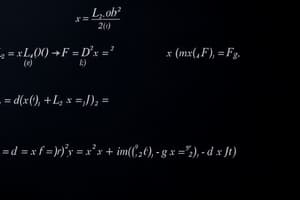Podcast
Questions and Answers
What is the fundamental process of differential calculus?
What is the fundamental process of differential calculus?
- Solving equations
- Differentiation (correct)
- Integration
- Matrix multiplication
What does the 'dy/dx' notation represent in differential calculus?
What does the 'dy/dx' notation represent in differential calculus?
- The rate of change of the function y with respect to x (correct)
- The slope of a function
- The integral of a function
- The second derivative
In which branch of calculus do derivatives play a paramount role?
In which branch of calculus do derivatives play a paramount role?
- Integral calculus
- Differential calculus (correct)
- Vector calculus
- Multivariable calculus
What is one of the applications of differential calculus mentioned in the text?
What is one of the applications of differential calculus mentioned in the text?
What do derivatives help us determine in the theory of functions?
What do derivatives help us determine in the theory of functions?
What do tangent lines represent in differential calculus?
What do tangent lines represent in differential calculus?
What type of functions can be differentiated according to the text?
What type of functions can be differentiated according to the text?
What do differentiation rules allow us to find the derivative of?
What do differentiation rules allow us to find the derivative of?
Under what condition can a function be differentiated according to the text?
Under what condition can a function be differentiated according to the text?
What concept helps us find the derivative of a composite function?
What concept helps us find the derivative of a composite function?
Study Notes
Matrix and Calculus: Differential Calculus Explored
In the realm of mathematics and its applications, Matrix and Calculus are crucial disciplines that lay the foundation for problem-solving and analysis in various fields. Here, we'll dive into the fascinating world of differential calculus, which is a key subtopic of calculus.
Differential Calculus: The Calculus of Rates and Slopes
Differential calculus focuses on the rate of change and slopes of functions. It's a branch of calculus that investigates the behavior of functions at specific points. The fundamental process of differential calculus is differentiation, which allows us to find the derivative of a function. The derivative of a function tells us the rate at which the function changes over the course of its domain.
Derivatives: The Language of Differential Calculus
Derivatives are of paramount importance in differential calculus. They're represented by the 'dy/dx' notation, which means the rate of change of the function y with respect to x. For instance, if f(x) = 3x^2 + 5x + 1, its derivative f'(x) = 6x + 5.
Applications of Differential Calculus
Differential calculus has an array of applications since it's a tool for understanding rates of change, and it's instrumental in:
- Physics: Derivatives are used to calculate the velocity and acceleration of an object, as well as energy, momentum, and power.
- Economics: Derivatives are used to evaluate changes in variables like demand, supply, and price.
- Biology: Derivatives help us understand rates of growth, decay, and reproduction.
- Engineering: Derivatives are used to analyze the efficiency and behavior of engines, machines, and systems.
- Theory of Functions: Derivatives help us determine the continuity, concavity, and critical points of functions, as well as whether a function is increasing or decreasing.
Additional Subtopics in Differential Calculus
- Limits: Limits help us understand how a function behaves as it approaches a specific point or value.
- Tangent Lines: Tangent lines are the lines that touch the curve of a function at a specific point.
- Continuity and Differentiation: Continuous functions can be differentiated, while discontinuous functions cannot.
- Differentiation Rules: Differentiation rules let us find the derivative of complex functions, such as sums, differences, and products of functions.
- Implicit Differentiation: Implicit differentiation allows us to find the derivative of a function when it's expressed as an implicit equation (i.e., y = f(x, y)).
- Chain Rule: The chain rule helps us find the derivative of a composite function, i.e., a function of a function.
Differential calculus is a fascinating and essential tool for understanding the behavior and properties of functions at specific points. With the knowledge of differentiation, we can analyze growth, decay, and change in a wide array of real-world scenarios. This makes differential calculus an indispensable component of mathematical education and problem-solving.
Studying That Suits You
Use AI to generate personalized quizzes and flashcards to suit your learning preferences.
Description
Test your knowledge of fundamental concepts in differential calculus, including derivatives, limits, tangent lines, continuity, and differentiation rules. Explore the key applications of differential calculus in physics, economics, biology, engineering, and the theory of functions.




